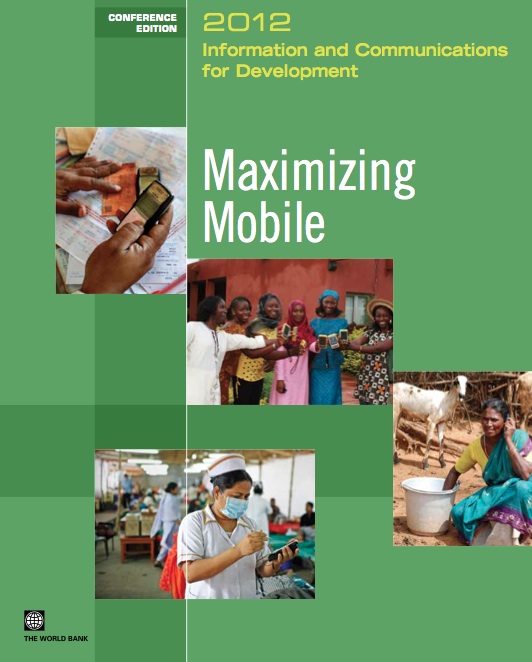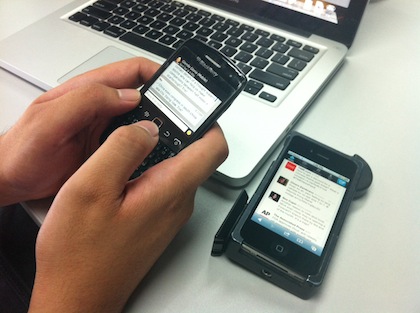SUMMARY
This is AI generated summarization, which may have errors. For context, always refer to the full article.
MANILA, Philippines – It’s a mobile world.
Mobile communications is “moving to a new level” according to a new World Bank report released Tuesday, July 17, with more than 3/4 of the world’s population having access to a mobile phone and a fast-expanding range of uses for the technology.
There are currently over 6 billion mobile subscriptions globally, up from just below 1 billion back in 2000. Out of these subscriptions (both postpaid and prepaid), 5 billion come from developing countries, the WB report said.
“Mobile telephony has been one of the most quickly adopted technologies of all time,” the report said. “Even more astounding, mobile networks have roughly doubled in size every two years since 2002. In early 2012 the number of mobile cellular subscriptions worldwide passed 6 billion.”
“Ownership of multiple subscriptions is becoming increasingly common, suggesting that their number will soon exceed that of the human population,” the WB said in a press release.
The report focused on maximizing mobile technologies for development, utilizing the fast-growing segment of communications for the economic and social growth particularly in developing countries.
“[In] some developing countries, more people have access to a mobile phone than to clean water, a bank account, or even electricity,” the WB said.
It showed mobile communications statistics for 152 economies, including the Philippines.
Compared to most countries, the Philippines has high access and usage statistics: an average of 101 cellphone subscriptions (both postpaid and prepaid) per 100 people; 96% of total subscriptions are prepaid; and 99% of the country is covered by a mobile-cellular network.
World Bank data also showed 80% of households have access to a mobile telephone as of 2011, up from 47% in 2005. The data also showed 97% of Filipino mobile phone users use SMS, while they average 69 minutes of calls per month.
The data also showed low mobile Internet usage compared to other countries. Only 23.1% of users have mobile broadband subscriptions, and only 9.8% of the population use mobile Internet.
Beyond calls and texts
The developing world is considered “more mobile,” with a higher ownership rate than the developed world.
However, the more important thing, the report said, is not the fast-rising number of people having access to mobile technologies, but rather the expanding use of these technologies beyond the calls and texts.

“The mobile revolution is transforming livelihoods, helping to create new businesses, and changing the way we communicate,” Marianne Fay, the WB’s chief economist for Sustainable Development Network, was quoted as saying.
One area of growth that shows this shift of mobile tech from just a means of communication is in mobile applications.
The report said 30 billion mobile applications were downloaded in the past year, “extending” the capabilities of phones and making them instant mobile wallets, job hunting search assistants, navigation aids, travel tools, and even leisure devices.
“The report finds that mobile applications not only empower individuals but have important cascade effects, stimulating growth, entrepreneurship, and productivity throughout the economy as a whole,” the report said.
Many mobile innovations also originate from the developing world, brought about by the needs of people in these areas – from banking to agriculture to even government services.
The report also explored the possibilities that mobile communications now present, with its ubiquity and accessibility – from solutions for agriculture and fisheries, to health, banking, and government services, especially in the developing world.
It also cited the different roles business, people, and government play in maximizing the benefits of this field of communication.
“The challenge now is to enable people, businesses, and governments in developing countries to develop their own locally-relevant mobile applications so they can take full advantage of these opportunities,” said Rachel Kyte, World Bank Vice President for Sustainable Development.
“Mobile communications promise to do more than just give the developing world a voice—they unlock the genie in the phone, empowering people to make their own choices and decisions,” the World Bank said.
The report, “Information and Communications for Development 2012: Maximizing Mobile” is the 3rd World Bank report on ICT for Development, funded by Ministry for Foreign Affairs of the Government of Finland, the Korea Trust Fund for ICT4D, and UKaid.
The full report can be accessed at the World Bank website, at http://www.worldbank.org/ict/ict4d2012. – Rappler.com
Related Stories:
Add a comment
How does this make you feel?

There are no comments yet. Add your comment to start the conversation.